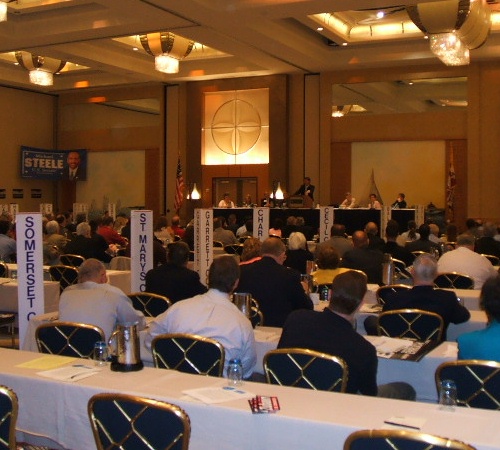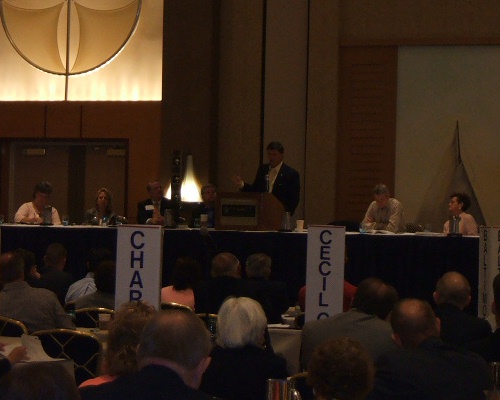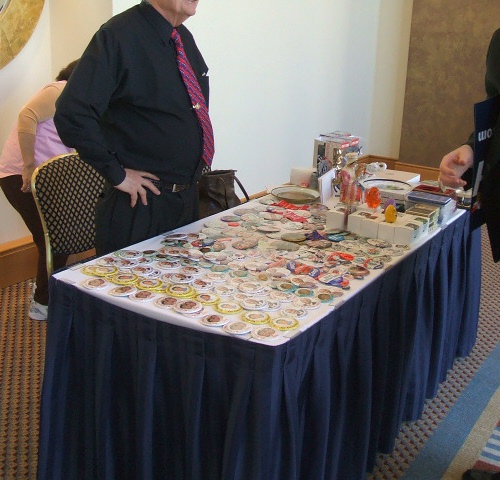It’s early in the week, so it’s time to wrap up my look at the ACU ratings with a quick trip to the Senate. In case you are joining the party late, here’s links to Part 1 and Part 2 of the series.
Like last time, I’ll post the issue first and my take on it afterwards.
1. Medicaid Cuts — Fiscal 2006 Budget Resolution. S Con Res 18 (Roll Call 58) The Senate adopted an amendment eliminating savings in the Medicaid program and other federal programs. The amendment also created a Bipartisan Medicaid Commission to study Medicaid before any cuts are made. ACU opposed this amendment, which was adopted 52-48 on March 17, 2005.
Michael’s opinion: Talk about gutless. Every time somebody wants to trim or change a program (in this case, “eliminating savings” – that’s a nice turn of phrase, guys), do we have to have a so-called bipartisan commission? Apparently so, that way the Senators’ fingerprints aren’t on it when there’s cuts to be made. I’m with the ACU on this one as a huge NO.
2. Tax Cuts — Fiscal 2006 Budget Resolution. S Con Res 18 (Roll Call 59) The Senate rejected an amendment striking language in the budget resolution protecting tax cuts. ACU opposed this amendment, which was rejected 49-51 on March 17, 2005.
Michael’s opinion: They should reject any and all amendments that come anywhere close to touching the Bush tax cuts, which are but a start in and of themselves. Again, the ACU is correct and I’d vote NO.
3. Social Security Benefit Tax — Fiscal 2006 Budget Resolution. S Con Res 18 (Roll Call 74) The Senate adopted an amendment repealing the 1993 tax increase on Social Security and increasing the five-year tax cut figure by $63.9 billion. ACU favored the amendment. The amendment was adopted 55-45 on March 17, 2005.
Michael’s opinion: This finally would get rid of the Clinton tax on Social Security. Of course it’s a great idea, thus both the ACU and I were/would be in the right to support it. YES.
4. Spending Increase — Fiscal 2006 Budget Resolution. S Con Res 18 (Roll Call 75) The Senate rejected an amendment reducing the amount of the tax cuts in the bill by $198 million and increasing spending by $36 million. ACU opposed the amendment, which was rejected 47-53 on March 17, 2005.
Michael’s opinion: Do you get the idea that neither the ACU nor I like spending increases or tax increases? To this amendment we say hell NO.
5. “ Mexico City” Policy — Fiscal 2006 State Department Authorization. S 600 (Roll Call 83) The Senate adopted an amendment repealing Reagan’s “Mexico City” policy, which bars U.S. aid to international family planning organizations that perform or promote abortions. Under the amendment, organizations could receive U.S. aid if they used their own funds to provide health or medical services that did not violate federal law or the laws of the country in which they are being provided. ACU opposed the amendment. The amendment was adopted 52-46 on April 5, 2005.
Michael’s opinion: Since I’m not a big believer in foreign aid it’s right to me that, because these other countries are gaining largesse at the expense of the American taxpayer, we have a perfect right to put strings on that money. The “Mexico City” policy is a sound one and repealing it sends the wrong message. Again, the ACU and I agree a NO vote was the appropriate one.
6. Confirmation William H. Pryor, Jr. of Alabama to be U.S. Eleventh Circuit Judge. (Roll Call 133) ACU favored the confirmation. Judge Pryor was confirmed 53-45 on June 9, 2005.
Michael’s opinion: As he should have been, along with a host of other constructionist judges. I’m still batting 1.000 with the ACU as we both favored the nomination with a YES vote.
7. Bolton Nomination — Cloture. (Roll Call 142) The Senate defeated a motion to stop debate and proceed to a vote on President Bush’s nomination of John Bolton to be the U.S. Representative to the United Nations. ACU favored the nomination. The motion was rejected 54-38 on June 20, 2005. Although a majority of the Senate favored the nomination, 60 votes are required to stop debate.
Michael’s opinion: That stupid cloture law. Isn’t it time for the “constitutional option” yet? The ACU is correct and I would have supported cloture with a YES vote.
8. Climate Change — Energy Policy. HR 6 (Roll Call 148) The Senate rejected an amendment that would have required U.S. businesses to return to the “greenhouse gas” emission levels of 2000. ACU opposed the amendment. It was rejected 38-60 on June 22, 2005.
Michael’s opinion: Of course I’m not voting for this junk science. The Senate killed the Kyoto Protocol years ago, this was an attempt to slide it in the back door. Once again, I concur with the ACU and would vote NO!
9. Fuel Economy Standards — Energy Policy. HR 6 (Roll Call 157) The Senate rejected an amendment mandating arbitrary increases in the Corporate Average Fuel Economy (CAFE) standards and extending the standards to trucks. ACU opposed the amendment. The amendment was rejected 28-67 on June 23, 2005.
Michael’s opinion: The CAFE standards – another bunch of crap. Let the market decide, not the government. NO.
10. Nuclear Weapons Funding — Fiscal 2006 Energy and Water Appropriations. HR 2419 (Roll Call 171) The Senate rejected an amendment prohibiting development of the Robust Nuclear Earth Penetrator. ACU opposed the amendment. The amendment was rejected 43-53 on July 1, 2005.
Michael’s opinion: Peace through strength, baby. Ronald Reagan was a genius. The ACU is correct in opposing the measure and I would say NO as well.
11. Immigration Enforcement — HR 2360 (Roll Call 182) The Senate rejected an amendment that would have increased funding for immigration and customs enforcement by about $200 million, added 5,760 detention beds, and permitted the hiring of more immigration enforcement personnel. ACU supported the amendment, which failed 42-56 on August 14, 2005.
Michael’s opinion: Pretty ironic that I go through these the day after the May Day protests, huh? Think some Senators might want to change their minds? For those who care about immigration like I do, you Delaware voters may want to ask Sen. Carper how he expects your vote for him in November when he voted against this provision – concurrently you Virginians can thank Sen. Allen for voting YES on it like I would. We here in Maryland can’t blame anyone since Sen. Sarbanes, a voter against it, is retiring, and Sen. Mikulski was absent on this vote.
12. Gun Liability — Passage. S 397 (Roll Call 219) The Senate passed a bill barring lawsuits against manufacturers and distributors of firearms and ammunition that would make them liable for gun violence. Penalties for violent or drug trafficking crimes in which the perpetrator uses or possesses armor-piercing ammunition are increased to a minimum of 15 years imprisonment– or, if death resulted from the use of such ammunition, life imprisonment or the death penalty. ACU favored the bill, which was adopted 65-31 on July 29, 2005.
I can copy what I said before in the House post (#21):
Michael’s opinion: It’s an appropriate use of federal power only because firearms are sold nationally. If it were many other products, I’d be less inclined to trump the states. And because there are federal crimes, the sentencing portions of the bill are appropriate as a guide to judges. The only worry I have about this is expansion of the measure someday to the general public where if someone shot a home invader using this ammunition they would face the same penalties. At this time, I’m with the ACU on the YES vote.
13. Mercury Emissions Rule — Passage. S J Res 20 (Roll Call 225) The Senate rejected a joint resolution that would have applied stringent and unjustified emission standards to existing electricity-generating plants. ACU opposed the resolution. It was defeated 47-51 on September 13, 2005.
Michael’s opinion: The key word the ACU accurately uses is “unjustified”. I believe it’s much more prevalent for mercury to occur naturally than by a power plant. I agree a NO vote was the correct vote.
14. Exposing Earmarks — Fiscal 2006 Agriculture, FDA, and Related Agencies Appropriations. HR 2744 (Roll Call 238) The Senate agreed to an amendment requiring better disclosure of “earmarks” in spending bills. Earmarks are used to direct spending to specific projects. ACU favored the amendment, which passed 55-39 on September 21, 2005.
Michael’s opinion: Suuuuuuuueeeeyyyyy! Get rid of that “pork!” This is a YES vote…why would anyone vote against this (who has half a brain?)
15. Minimum Wage Increase — Fiscal 2006 Transportation, Treasury-Housing Appropriations. HR 3058 (Roll Call 257) The Senate defeated a procedural motion designed to increase the minimum wage to $5.70 six months after the bill’s enactment and to $6.25 one year after enactment. ACU opposed the motion. The motion was rejected 47-51 on October 19, 2005 (60 votes would have been required under Senate rules).
Michael’s opinion: Sixty votes would have been required, mine would not have been one. There should be no federal minimum wage in the first place. Optimally, there shouldn’t be state ones either, but that is the proper venue to determine a minimum wage, not the federal level. This is a NO vote in agreement with the ACU.
16. Cap on Spending Increases — Deficit Reduction Act of 2005. S 1932 (Roll Call 286) The Senate defeated a procedural motion that would have allowed an amendment to cap most future spending at 2006 levels. ACU favored the amendment and the motion. The motion was rejected 32-67 on November 3, 2005.
Michael’s opinion: Again, a conservative fiscal issue, and there’s 67 Senators who are walking around singing soprano because they didn’t have the balls to vote for this. I think I’m an alto (whatever a semi-nasal voice would sing), but I can’t carry a tune in a bucket anyway. However I could vote YES on this if given the chance, provided military spending was exempted.
17. ANWR Oil and Gas Leasing — Budget Reconciliation. S 1932 (Roll Call 288) The Senate rejected an amendment striking language permitting oil and gas leasing in a small portion of Alaska’s Arctic National Wildlife Refuge (ANWR). ACU opposed the amendment, which was rejected 48-51 on November 3, 2005.
Michael’s opinion: As in House issue #6, drill as many holes in ANWR as needed. The ACU and I are in full agreement with a NO vote.
18. Budget Reconciliation — Passage. S 1932 (Roll Call 303) The Senate passed a bill that will save approximately $35 billion over five years. ACU favored the bill, which passed 52-47 on November 3, 2005.
Michael’s opinion: A drop in the bucket, but it’s better than nothing. YES.
19. Habeas Corpus for Enemies — S 1042 (Roll Call 324) The Senate rejected an amendment granting detainees and enemy combatants the right to petition for habeas corpus in the U.S. civil courts rather than military tribunals. ACU opposed the amendment, which failed 44-54 on November 15, 2005.
Michael’s opinion: Uuuuuuuhhhhh…these are ENEMY combatants, are they not? By being an enemy of the United States and actively fighting to usurp it, you have the right to be shot dead. And that’s it. I know, I have no empathy to the downtrodden victims of American capitalism…damn right I don’t. That’s a NO vote and an ulcer-inducer as I again want to bitchslap 44 Senators who voted for this garbage.
20. Tax Increases on Oil and Gas Development — Tax Relief Act of 2005. S 2020 (Roll Call 332) The Senate rejected a procedural motion on an amendment that would have raised taxes on oil and gas development. ACU opposed the motion. The motion was rejected 48-51 on November 17, 2005 (60 votes would have been required under Senate rules).
Michael’s opinion: Give me a break. Who comes up with this crap? We need lower taxes in oil and gas development, not the other way around! Make the 48 Senators who voted yes pay $6 a gallon to fill up their Excursions and Tahoes. Me, I’d vote NO as is proper.
21. Federal Interference in Energy Markets –Tax Relief Act of 2005. S 2020 (Roll Call 334) The Senate rejected a procedural motion on an amendment that would have allowed the Federal Trade Commission to interfere in energy markets during emergencies. ACU opposed the motion, which was rejected 57-42 on November 17, 2005 (60 votes were required under Senate rules).
Michael’s opinion: Let me see. The government has screwed up the health care market, now they want to interfere with the energy market? It sounds like someone at the FTC wanted to make sure his union buddies had a job to do. Not with my vote you don’t. That’s a solid NO.
22. Physician Senators Right to Practice Medicine — Tax Relief Act of 2005. S 2020 (Roll Call 335) The Senate rejected a procedural motion on an amendment that would have allowed physician Senators to practice medicine as long as they charged only for expenses. ACU favored the motion. The motion failed 51-47 on November 17, 2005 (60 votes were required under Senate rules).
Michael’s opinion: As I recall, this measure was rejected to get back at Sen. Coburn of Oklahoma, a dogged foe of earmarks and wasteful spending, who does happen to be a doctor and wanted this amendment. A Senator who has a job outside of politics? Perish the thought! Of course the ACU is correct (again!) and I’d vote YES. Actually, if I had the choice of whether he could practice medicine for profit, that would be even better.
23. Extension of Tax Cuts — Tax Relief Act of 2005. S 2020 (Roll Call 347) The Senate passed a bill extending certain expiring tax cuts and providing tax relief for areas affected by recent hurricanes. ACU favored the bill, which passed 64-33 on November 18, 2005.
Michael’s opinion: I’m leery about the Katrina/Rita relief (bad precedent for future natural disasters) but the tax cuts should be extended. Actually, they probably should be made permanent, but I would have to vote for this on balance as the best I could get (for now.) A YES vote with the ACU.
24. Block Grant Spending. H J Res 72 (Roll Call 348) The Senate rejected an amendment increasing the amount appropriated under the Community Services Block Grant Act. ACU opposed the amendment. The amendment was rejected 46-50 on November 18, 2005.
Michael’s opinion: I can see the ACU’s point. I’m almost tempted to say yes to this, but I suppose the idea of less spending would win me over as opposed to increasing a block grant. So I’ll stick with the NO vote, tenuously. This is definitely one I’d love to have the fine print on.
25. Work, Marriage, and Family Promotion Reconciliation Act of 2005. S 1932 (Roll Call 363) The Senate passed a budget reconciliation bill containing most of the deficit reduction provisions desired by President Bush. The bill passed 50-50 on December 21, 2005 (Vice President Cheney cast the tie-breaking vote).
Michael’s opinion: Oh boy, is this a “feel-good” act. The devil is in the details, but I guess I’d have to be ignorant like most Senators are when they vote on items and go with the flow here. I have the bad feeling that this was a pork-laden bill, but in the rush to get out of town for the Christmas holiday, who was going to say no? Because I’m only going by the short description provided by the ACU and not the text of the bill, I would vote YES solely for the deficit reduction measures.
These last two bills are would have my very soft support, but as it stands I’m a perfect 100 on the Senate side. That means I join 12 other Senators who have the same 100% ACU record:
George Allen (R-VA), Sam Brownback (R-KS), Tom Coburn (R-OK), Mike Crapo (R-ID), John Ensign (R-NV), James Inhofe (R-OK), Johnny Isakson (R-GA), Jon Kyl (R-AZ), Mel Martinez (R-FL), Mitch McConnell (R-KY), and Jeff Sessions (R-AL). Conrad Burns (R-MT) also had a 100 rating but missed one vote.
So I suppose those on the left who think I’m a “mind-numbed robot” would have a case because I’m in lockstep with the ACU. But if People for the American Way had a similar system and I scored 100, would I not be a mind-numbed robot of the left? In these cases, unlike the House, the ACU scored votes that were almost all cut-and-dried – you either supported lower spending, tax cuts, and fewer regulations or you didn’t. And I do, because as far as I’m concerned I have a little desktop book I look at frequently that is a guide to the functions of Congress. It’s called the Constitution.
It’ll be interesting to see the 2006 ratings when they come out next April. I have the bad feeling that a 100 rating from the ACU is going to be rare as all of the House and 1/3 of the Senate are up for election, and one sure way to get votes from the ignorant is to throw money at them. But I bet my personal ratings will be right up there, because I can do this on principle, not to get a vote. At least for now.







